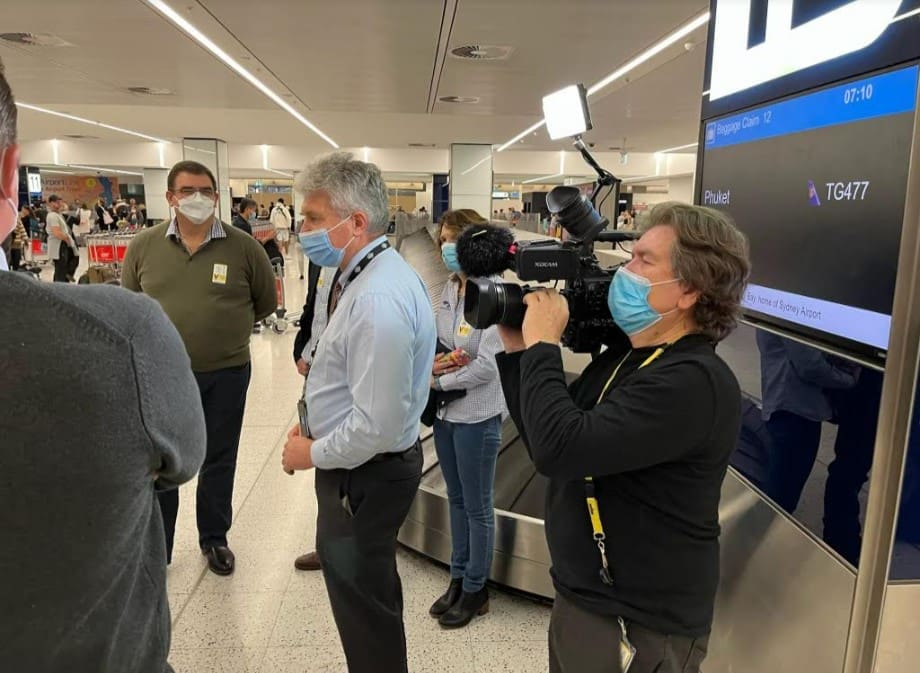
Leaders from Australia’s livestock industries this week visited the Sydney International Airport to see measures in place to protect Australia from exotic animal diseases.
Travellers entering Australia from Indonesia are exposed to more than 20 “biosecurity touch points”.leaders were told.
The behind-the-scenes inspection was hosted by the Department of Agriculture, Fisheries and Forestry’s Biosecurity and Compliance Group.
It featured a step-by-step review of the increased biosecurity measures in place from plane arrival through to baggage collection and exit.
The inspection was a collaboration between Government and representatives from Meat & Livestock Australia, Australian Meat Industry Council, Wilmot Cattle Co, Australian Pork Limited and Australian Wool Innovation.
The Australian Government has implemented a range of further urgent measures to reduce the risk of exotic diseases such as Foot and-mouth disease (FMD), Lumpy skin disease (LSD) and African swine fever (ASF) from entering Australia.
Agriculture Minister Murray Watt said it was a great opportunity for industry to see firsthand the strong measures implemented by the government at the borders.
“We have been working hand in hand with industry to make sure our response to the threat of FMD is appropriate,” Minister Watt said.
“Australia remains FMD-free and we will do everything we can to keep it that way.”
One of the outcomes of the tour will be a video showing the enhanced biosecurity measures. The video is intended for Australian livestock producers, the broader supply chain and the community to help convey the industry leaders’ confidence in the significant measures in place to protect Australia from an exotic animal disease incursion.
The group was provided an overview of the large number of the biosecurity touch points including announcements and handouts to passengers before disembarking, sanitation foot mats, passport and Inbound Passenger Card checking, passenger profiling, roaming biosecurity officers, x-ray inspections, detector dogs, manual inspections and the unprecedented level of screening of incoming cargo and mail now in place.
While the Australian Government carries the responsibility for protecting Australia from biosecurity risks, the industry is doing everything it can to support their work.
Australia has some of the strictest biosecurity protocols in the world and industry has invested hundreds of millions of dollars to develop lifetime traceability systems, partly in response to the risk of an exotic disease incursion.
Additional information:
- Australia is completely free from diseases such as FMD, LSD and ASF.
There is no threat to human health from these diseases.
As part of the Australian Government’s response to the threat of animal diseases in the region, the Department of Agriculture, Fisheries and Forestry has increased its surveillance and testing of meat and other animal products, both at the border and through targeted checking of retail outlets.
Foot-and-mouth disease is considered one of Australia’s greatest biosecurity threats to livestock and an incursion of FMD or ASF would have severe consequences for Australia’s animal health, trade and economy and our regional communities.
Breaches of Australia’s biosecurity are taken very seriously. Penalties for those who do the wrong thing include imprisonment for up to 10 years or a fine of up to $1,110,000 (or $5,550,000 for corporate entities) or both. Individual travellers can receive infringements of up to $2664 for failing to declare on their traveller declaration when entering Australia and could have their visa cancelled for breaching biosecurity laws.
Everyone has a role in preventing harmful pests and diseases from entering Australia. If you are travelling, importing goods or ordering goods through the mail, be aware of what is permitted entry to Australia. You can do this by checking: Bringing or mailing goods to Australia, on the Australian Government website.
For information from the Department of Agriculture, Fisheries and Forestry for travellers related to FMD, visit: Advice to travellers, on the Australian Government website.
Producers are urged to exercise vigilance on-farm by:
- being aware of the symptoms of FMD and LSD
calling the Emergency Animal Disease Watch Hotline on 1800 675 888 if you suspect LSD or FMD in your livestock
adhering to all traceability obligations, including meeting your requirements under the National Livestock Identification System (NLIS) and completing National Vendor Declarations so they are clear, complete and correct.
reviewing your on-farm biosecurity plan.
Source: MLA
